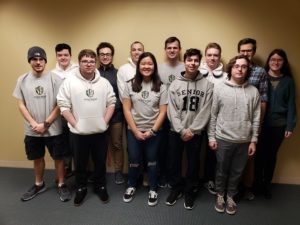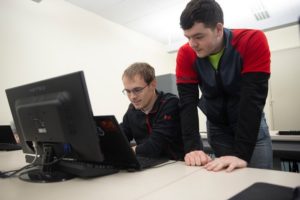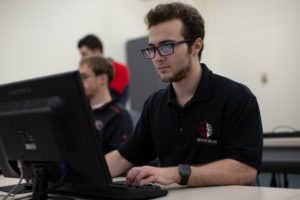
Members of the Southeast Cyber Defense Team are, in the back row, from left: Joseph Kossack, Giovanni Licameli, Quinn Johnson, Connor Bybee, Elijah Iverson, Andrew Banning and Sierra Wetmore. In the front row, from left, are Gabe Stier, Jennifer Tenholder, Jack Gavin and Ethan Gyori.
For the eighth straight year, the Southeast Missouri State University Cyber Defense Team has won the Missouri Collegiate Cyber Defense Competition (CCDC).
The Southeast students participated Feb. 15 in the virtual competition, finishing ahead of Drury University, second place; and Northwest Missouri State University, third place.
The Southeast team now advances to the Erich J. Spenger Midwest Regional Collegiate Cyber Defense Competition March 13-14 at Moraine Valley Community College in Palos Hills, Illinois. Teams in the Midwest Regional competitions will represent Missouri, Wisconsin, Kentucky, Indiana, Illinois, Michigan, Minnesota, Ohio and Iowa.
Southeast students competing in the Missouri CCDC wereEthan Gyori of Eureka, Missouri; Jack Gavin of Lees Summit, Missouri; Giovanni Licameli of St. Peters, Missouri; Max Foster of Freeburg, Illinois; Connor Bybee of Carterville, Illinois; Sierra Wetmore of Iuka, Illinois; Gabe Stier of Sherman, Illinois; and Andrew Banning of Salem, Illinois. The teams alternates are Joseph Kossack of Vienna, Illinois; Jennifer Tenholder of Florissant, Missouri; Elijah Iverson of Bloomington, Illinois; and Quinn Johnson of Weston, Missouri.
The University has made sustained investments in cybersecurity education and development of the skills required for our graduates to solve global security challenges, said Dr. Chuck McAllister, interim chair of the Department of Computer Science. The performance of this team demonstrates that Southeast continues to be at the forefront in the development of cybersecurity professionals in Missouri.
Dr. Mario Alberto Garcia, director of the Universitys Cybersecurity Institute and professor of computer science, said, I would like to extend my congratulations to all members of the team. They are an example of dedication, discipline, hard work, and desire to learn. It is inspiring to see how they organize their team practices week after week in addition to their normal academic and personal activities. They continue to make the department, college and the University proud.
Now, lets plan for the next step — win regionals and go to nationals, Garcia added.
Dr. George Li, assistant professor of computer science and advisor to the team, said, The team has worked extremely hard all year to prepare for the competition, and our faculty are extremely proud of their achievements.
Gyori, the teams captain, said “Winning the state competition is always a bonus. Our team truly strives to learn and implement the cybersecurity strategies and theories we are taught in the classroom. From there, we are able to expand upon those theories with real-world implementation through the Collegiate Cyber Defense Competition.
Winning this competition is proof not only of our team members hardwork, but also of the foundation that SEMOs cybersecurity program has laid for us toexpand upon, he said.

Cyber Defense team members, including Gabe Stier, left, and Joseph Kossack master skills for future careers in cybersecurity while preparing for this year’s competitions.
The competition is designed to test each teams ability to secure a networked computer system while maintaining standard business functionality. The scenario of each competition involves team members simulating a group of employees from an IT service company that initiate administration of an Information Technology (IT) infrastructure. The teams are expected to manage the computer network operations in a simulated business environment, keeping it operational, and preventing unauthorized access. Each team must maintain and provide public services, including a web site, a secure web site, an email server, a database server, an online curriculum server and workstations used by simulated sales, marketing and research staff per company policy and mission.
Teams start the competition with a set of identically configured systems. A technical success that adversely impacts a business operation results in a lower score as does a business success resulting in security weaknesses.
Student teams are scored on their ability to detect and respond to outside threats, including cyberattacks, while maintaining availability of existing network services such as mail and web servers, responding to business requests such as the addition or removal of additional services, and balancing security against business needs.
Being successful and winning is definitely something we want to continue, said Gyori. Each competition provides a learning experience. Its not just a drive to win, but its learning, and thats what we look forward to and enjoy.
Foster, the teams networking specialist, added, I think we have a very talented team this year. We know its important to not forget the small things. Everyone is very smart and focused.
The team is looking forward to the regional competition.
Its a test to see where our skills are and where we think we should be, added Foster. Our team members want to see how we do and prove ourselves.
